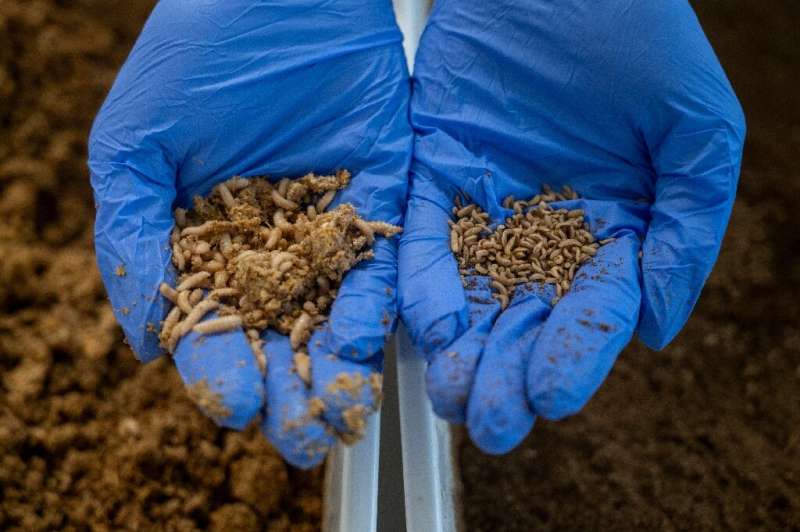
[ad_1]

Black soldier fly larvae, such as those at the Pronova laboratory in Frederiksstad, are one of the options being studied for use as salmon feed.
Norwegian fish farms are feeding their salmon a vegetarian diet to make their business more sustainable, but it’s not all rosy for these carnivorous pink-fleshed fish.
In submerged cages at the Oksebasen fish farm at the crossing of two fjords in western Norway, the salmon are under constant surveillance on mobile underwater cameras.
At the first sign the fish are feeling the slightest tingle, workers at an operations center 100 kilometers (60 miles) away turn on a “sub-feeder” that quickly releases special pellets through the hungry fish.
The small brown pellets are composed primarily of plant-based materials, 20 to 30 percent fish oil and food, as well as vitamins, minerals, and pigments to give salmon meat its characteristic pink color.
“First, Fish meal It was made with only marine ingredients,” or in other words, wild fish, explains Magnalf Gisk, operations manager at Movi, the world’s largest producer of Atlantic salmon.
“But it’s a less sustainable solution than replacing some of these marine ingredients with soy protein, for example. So we’ve gone in that direction,” he said.
For the industry, avoiding overfishing is a question of sustainability, but also, and more fundamentally, a way to ensure that business continues to grow.
With limited stocks of small fish commonly used in fish meal, such as anchovies, sprat and herring, fish farms have increasingly turned to cheaper plant-based materials to increase production.
“There wasn’t enough fishmeal in the world to supply this industry,” said Erik Jan Locke, a researcher at Norway’s food research institute Nofima.
Going against nature
Use of Wild fish Fish consumption has declined in recent years but still remains a component, according to environmental groups, concerned about the negative impact overfishing can have on waterfowl and poor populations in places like West Africa.
Fish as well as soy and plant proteins could be used directly in the feed. Human consumption“But instead they are given to salmon to make more expensive, higher-paying products for the rich,” lamented Trolls Glausen, head of the Norwegian branch of Friends of the Earth.
“Globally, it’s a very sad way to use up scarce resources for a growing world population that needs food and needs protein,” he said.
“We don’t really need salmon fillets.”
While Norwegian animal feed producers agreed in 2015 to use only sustainably produced soy, the increased use of plant-based materials has not been without its challenges.
“The more herbivorous salmon get, the further away they are from their original habitat, and the gap between native wild salmon and farmed salmon is increasing,” Glosson said. said
Farmed salmon “grows faster, it grows differently, it functions differently,” he said, adding: “We have a lot of escapes of farmed salmon that sometimes escape natural wild salmon stocks. pollutes.”
“The more different the new salmon, the more dangerous the genetic contamination of natural stocks.”
Bee to the rescue?
Nofima says fish farms need to find alternative ways to reduce their environmental impact.
“Is the salmon feed more sustainable than it was last year, or the year before? Yes,” says Eric John Locke. “Could it become even more sustainable? Yes, obviously.”
Better use of human food waste, or underutilized marine resources such as mussels and squirts or insects are among the possible options that could be explored.
Pronofa Company is researching sustainable protein alternatives.
In containers at its site in the southeastern town of Frederiksstad, it is studying the black soldier fly, whose larvae grow 7,000 times their weight in just two weeks.
“The fish industry in Norway gives human food to salmon, to fish, which is actually not a good thing. Here we have a good alternative to fish food,” says project manager David Tehrani.
Black Soldier Bees “Nature gives us the best machines: they eat all the time, they don’t sleep, they don’t take coffee breaks.”
“They eat everything except glass, concrete and steel”.
The only catch? This is a valuable solution.
Fish farmers, for whom feed represents their biggest cost, have not yet taken the bait.
© 2024 AFP
Reference: Norway’s salmon farms turn to veggie menus (2024, February 22) Retrieved February 22, 2024, from https://phys.org/news/2024-02-norway-salmon-farms-veggie-menu.html
This document is subject to copyright. No part may be reproduced without written permission, except for any fair dealing for the purpose of private study or research. The content is provided for informational purposes only.
[ad_2]


